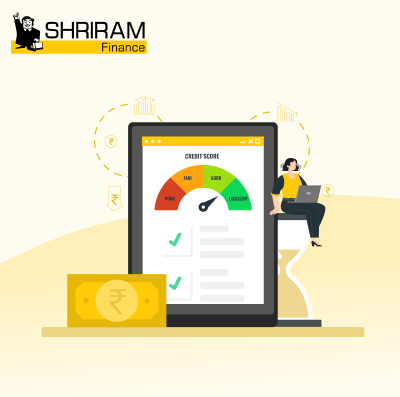Introduction
Maintaining a good credit score and credit report is crucial when making financial decisions. Equifax India, also known as Equifax Credit Information Services Private Limited (ECIS), is approved by the RBI and is a credit bureau. They offer credit information services under the Credit Information Companies Act of 2005.
Equifax India collects and keeps track of information about consumers that banks and other financial institutions provide every month. Whether you are seeking to borrow funds or lend them, you can utilise Equifax's credit score check and reports for your financial decisions. This helps you decide if someone is trustworthy when it comes to credit. If you want to know more, Shriram Finance is here to help you with your financial needs.
Demystifying the Equifax India Credit Report
Equifax India credit report is a comprehensive document that summarises an individual's credit history and repayment behaviour. It contains vital information such as personal details, credit summary, account details, inquiries section, and public records section. Lenders use this report to assess the risk in lending money to an applicant. Equifax utilises its proprietary algorithm to calculate the credit score, which ranges between 300 and 900. The higher the score, the better the creditworthiness of an individual.
Your Guide to Understanding Equifax India Credit Scores
Factors that Affect Your Credit Score
Here's your guide to understanding Equifax India Credit Scores and the key factors that influence them. Equifax uses various factors to calculate the credit score:
- Repayment History: Timely payment of bills and loan EMIs showcases responsible credit behaviour and positively impacts your credit score.
- Credit Utilisation Ratio: It measures the proportion of utilised credit compared to the available limit across all accounts. A high ratio indicates a higher dependence on credit, which may negatively affect your score.
- Type of Credit Utilised: Handling a healthy mix of secured and unsecured credits demonstrates your ability to manage different types of credits effectively.
- Number of New Credit Applications: Applying for multiple new credits within a short period might indicate financial distress or a higher debt burden, which can impact your score negatively.
- Length of Credit History: A longer track record of responsible credit behaviour tends to have a positive impact on your credit score.
How to Check and Download Your Equifax Credit Report
To access and retrieve your Equifax Credit Report, adhere to the following instructions:
- Click on the provided link to access the Equifax website.
- Enter your details as mentioned in the credit score form and verify using OTP authentication.
- Click the 'Get Your Credit Score' button to obtain the credit score.
- On the Equifax tab, click 'Download Report' to choose the language and month for download.
- Use your Date of Birth as the password to open your Equifax report.
Interpreting Equifax credit scores
Here's how to interpret your Equifax credit score:
- Excellent (800-850): High creditworthiness, offering the best loan terms and rates.
- Very Good (740-799): Strong credit, with favourable terms but not the best.
- Good (670-739): A solid credit profile, qualifying for most loans and cards.
- Fair (580-669): Some credit challenges lead to higher rates and limited options.
- Poor (300-579): Low credit score, making it difficult to access credit with high rates.
Tips for Maintaining and Improving Your Equifax Credit Score
Here are some credit score improvement tips to help you boost your creditworthiness:
- Fix Your Payments: Pay all bills and EMIs on time to demonstrate responsible credit behaviour.
- Pay in Full: Avoid paying only the minimum balance due, as it reflects negatively on your credit score.
- Keep Old Accounts Open: Closing old accounts shortens your credit history. This may lower the score. Maintain a longer credit history by keeping them open if they are in good standing.
- Limit Credit Inquiries: Multiple inquiries within a short period can indicate financial distress or excessive borrowing, which may negatively impact your score.
- Monitor Your Credit Report: Regularly review the Equifax credit report for errors or discrepancies that could harm your creditworthiness. If you find any mistakes, dispute them promptly.
Exploring the Different Sections of Your Equifax Credit Report
Reading your Equifax Credit Report involves examining various sections to understand your credit history and financial standing. Here's a step-by-step guide:
- Personal Details: This section encompasses information such as your name, address, and contact details.
- Credit Summary: It furnishes a snapshot of your complete credit standing, encompassing the count of accounts, present balances, and payment statuses, among others.
- Account Details: Within this section, you'll uncover particulars concerning each account, including its nature (secured or unsecured), payment track record, and outstanding debts, among other details.
- Inquiries Section: It lists inquiries made by lenders or service providers regarding your creditworthiness.
- Public Records Section: This section records any bankruptcies, court judgments, or other legal proceedings that may impact your creditworthiness.
By conducting a thorough Equifax credit report analysis, you can pinpoint areas for improvement and take proactive steps to maintain or enhance your credit health over time.
Why Regular Monitoring of Your Equifax Credit Report is Essential
Regularly staying updated with your Equifax credit report benefits you in multiple ways, making it crucial for the following reasons:
- Identify Errors or Discrepancies: Consistent monitoring enables you to spot and address any inaccuracies or discrepancies in your report, safeguarding the credit score from potential harm.
- Detect Unauthorised Accounts or Fraudulent Activities: It aids in promptly identifying unauthorised accounts or fraudulent actions associated with your identity, safeguarding your financial well-being.
- Maintain a Healthy Credit Profile: By staying updated on changes within the credit report, you can proactively manage your financial standing, ensuring a robust credit profile and the potential for score improvement.
Utilising Equifax credit monitoring services ensures you are well-equipped for effective creditworthiness assessment over time.
Conclusion
Equifax India Credit Reports and Credit Scores are essential for understanding your credit health. They help you see what affects your credit score and allow you to make smart money decisions. Checking the Equifax report regularly helps you manage the credit better.
Follow these tips to keep your credit score in good shape over time. If you need help with your credit, think about using Shriram Finance for expert guidance and support to secure your financial future.































